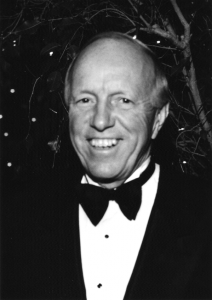This post is part of The Plank Center’s Legacies from Legends in PR Series that was begun in recognition of the 40th Anniversary of the Public Relations Student Society of America in 2007.
Career included 42 years in public relations, advertising and marketing with Rockwell, The Raytheon Company and Sperry Rand Corporation. Chaired the PR Seminar and Global Public Relations Council, and served on boards of the Arthur W. Page Society and the Advertising Council. Taught public relations at San Diego State University; served as an advisor to the Dean of the Graduate School of Business, William and Mary College. Recipient of the Arthur W. Page Society’s Hall of Fame Award (1999).
My perspective on the field of public relations is rooted primarily in service to public corporations. Fundamental to success in serving the public interests of any organization is a dedication to understanding and applying the fundamental skills of communication as though the very existence of your organization depended upon it. Sounds so obvious that it is hardly worth saying, doesn’t it?
Before I go further, I ask you to consider this sage advice from Arthur W. Page, a great pioneer in public relations. He said, “All business in a democratic society begins with public permission and exists by public approval.” I recommend applying this fact in respect to the importance of communications in every facet of an organization. Think also of the implications to constituencies of organizations (e.g., employees, customers, share owners and suppliers) whose management has the accountability for building and maintaining public trust. At the core of earning public trust is strong, insistent and consistent communications management from within. Those of us in this field must be prepared to supply the vision, leadership and professional ingredients to meet this challenge.
Today, implications of the term “public corporation” are more demanding than ever. Virtually every issue confronting corporate management is laced with public relations considerations. Responses to these issues, in most cases, involve global public and, as a result, varied social, economic and cultural interpretations of your message. The complexities of ensuring that your public intentions are favorably received have grown exponentially as have the methods and speed of disseminating information. From my view, the skills of communication haven’t changed much over time. However, competing in the global marketplace poses challenges that were incomprehensible only a few years ago.
The world in which we trade and communicate has undergone immense change, but there remains a somewhat naive attitude among management leaders about the significance of professional communications in the management structure. Are we publicity agents, reputation gurus, advertising specialist, crisis responders or does our appropriate accountability span all of these as the organization’s senior public policy official? Along with other senior members of the executive group, we must earn the position as solid, sensible, knowledgeable executives who participate fully at the inner circle of management. Since my retirement, I have witnessed numerous examples of public, private, government and non-profit organization catastrophes where assignment of public accountability was sadly lacking and, quite possibly, primarily responsible for those failures.
Of course, those with ambitions to practice public communications at the highest levels must prepare themselves. The fundamentals are critical to success in any field. Clear, concise and credible communications skills are essential personal attributes for leadership in public relations.
Understanding business principles is basic to participating in the organization’s management process. Seeking and listening to mentors on any subject that’s conceivably helpful in building steps to a successful career path is a sign of good judgment. Common sense and hard work are useful frostings on the cake.
The future will undoubtedly provide unimaginable challenges and opportunities for public relations executives. The speed with which information moves is a double-edged sword. It will be your measure of success to accurately interpret the needs, timing and content for communications to the marketplace. Arthur W. Page’s admonition to “manage for tomorrow” has never been more relevant.
Published: 2007
